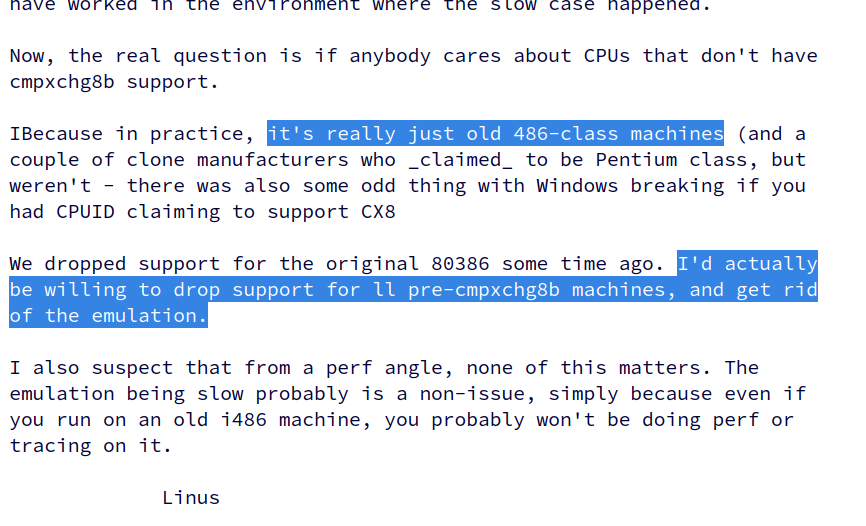Posts
5081Following
332Followers
504OpenPGP: 3AB05486C7752FE1
Jarkko Sakkinen
jarkkoI packed swtpm for the #QEMU build so it does not have to be installed to the system:
https://github.com/jarkkojs/tpmdd-buildroot-external
start-qemu.sh will automatically setup shenanigans so that swtpm will work as TPM emulation host for QEMU.
After build there’s three options:
- TPM2 TIS/FIFO:
output/build/images/start-qemu.sh - TPM2 TIS/CRB:
output/build/images/start-qemu.sh --tpm-crb - TPM1 TIS/FIFO:
output/build/images/start-qemu.sh --tpm1
Right, and neither QEMU needs to be installed to the host. I’m trying to sort of construct this in a way that it would become as CI friendly as possible so that this could be in addition used as a CI workload for keyutils.
Jarkko Sakkinen
jarkkoAfter some experimentation it is best the define boards in this context as fairly self-contained packages to the specific test devices at hand and not have anything shared e.g. by CPU architecture even at the cost of some redundancy:
$ tree
.
├── Config.in
├── LICENSE
├── board
│ └── tpmdd_qemu_x86_64
│ ├── linux.config
│ ├── post-build.sh
│ ├── post-image.sh
│ └── start-qemu.sh.in
├── configs
│ └── tpmdd_qemu_x86_64_defconfig
├── external.desc
└── external.mk
4 directories, 9 files
E.g. similarly I’ll add tpmdd_raspberrypi3b target and so forth. For instance, I would not share post-image.sh and similar scripts between boards even if they were 1:1. It kills robustness.
The orchestrator itself has a flat repository:
$ tree
.
├── LICENSE
├── Makefile
└── README.md
I licensed external with GPL2 for the sake of upstream compatibility and orchestrator with MIT. This is overally pretty usable structure to use Buildroot.
Jarkko Sakkinen
jarkkoMy new (WiP) orchestrator for building test image for testing my #kernel tree is fully implemented with GNU make:
# SPDX-License-Identifier: MIT
ROOT := $(dir $(abspath $(firstword $(MAKEFILE_LIST))))
BUILDROOT_VERSION := 2023.11
OUTPUT := $(ROOT)output
BUILDROOT_URL := https://buildroot.org/downloads/buildroot-$(BUILDROOT_VERSION).tar.gz
EXTERNAL_URL := https://github.com/jarkkojs/tpmdd-buildroot-external/tarball/main
define make-buildroot
make -C "$(OUTPUT)/buildroot" BR2_EXTERNAL="$(OUTPUT)/external" O="$(OUTPUT)/build" $(1)
endef
define download-package
mkdir -p $(2)
curl -sL "$(1)" | tar -zxv -C "$(2)" --strip-components=1
endef
all: buildroot
.PHONY: buildroot
buildroot: $(OUTPUT)/download-stamp
$(call make-buildroot,tpmdd_qemu_x86_64_defconfig)
$(call make-buildroot,all)
.PHONY: buildroot-menuconfig
buildroot-menuconfig: $(OUTPUT)/download-stamp
$(call make-buildroot,tpmdd_qemu_x86_64_defconfig)
$(call make-buildroot,menuconfig)
$(call make-buildroot,savedefconfig)
.PHONY: linux-menuconfig
linux-menuconfig: $(OUTPUT)/download-stamp
$(call make-buildroot,tpmdd_qemu_x86_64_defconfig)
$(call make-buildroot,linux-menuconfig)
$(call make-buildroot,linux-savedefconfig)
$(OUTPUT)/download-stamp:
$(call download-package,"$(BUILDROOT_URL)","$(OUTPUT)/buildroot")
$(call download-package,"$(EXTERNAL_URL)","$(OUTPUT)/external")
touch $@
.PHONY: clean
clean:
rm -rf "$(OUTPUT)"
It is pretty robust structure because I can e.g. easily add packages (like maybe host swtpm) in a robust manner to buildroot.
Jarkko Sakkinen
jarkkoTo test latest linux-tpmdd changes:
git clone https://github.com/jarkkojs/test-tpmdd
cd test-tpmdd
make
Then:
- TPM2 TIS/FIFO:
output/images/start-qemu.sh --swtpm - TPM2 TIS/CRB:
output/images/start-qemu.sh --swtpm --tpm-crb - TPM1 TIS/FIFO:
output/images/start-qemu.sh --swtpm --tpm1
Tools for testing (more in future):
keyutilsfor testing keyring and trusted keys/usr/lib/kselftests/run_selftests.sh
Requires swtpm to be installed (but not QEMU, it will build one).
Jarkko Sakkinen
jarkkoI'll focus on x86_64 first and then work on adding Raspberry Pi 3B+ support back.
https://github.com/jarkkojs/test-tpmdd
#linux #kernel
Jarkko Sakkinen
jarkkoJarkko Sakkinen
jarkkoWith email the threat scenario is mostly emails themselves and I cannot 100% guarantee that I do not fall on phishing unless I use text based email client :-)
Jarkko Sakkinen
jarkkoJarkko Sakkinen
jarkkoThorsten Leemhuis (acct. 1/4)
kernellogger@fosstodon.orgLinus might be willing to drop support for i486-class machines[1] from the #Linux #kernel.
No, nobody asked for that directly; he brought that up in a discussion himself: https://lore.kernel.org/all/CAHk-%3DwhESMW2v0cd0Ye%2BAnV0Hp9j%2BMm4BO2xJo93eQcC1xghUA@mail.gmail.com/ #LinuxKernel
[1] and a couple of processors which _claimed_ to be Pentium class, but weren't
Jarkko Sakkinen
jarkkoI even had one Windows machine at some point but it required more maintaining than my other machines, NAS, network router etc. added together so I gave up on that... And Windows has also worst audio stack of the industry: the native one is pure garbage so there is proprietary ASIO stack that everyone uses from Steinberg, which results a trainwreck system overally.
Why people say that Linux audio sucks had nothing to do with kernel, it was just that low-latency audio was not well supported up until the uncrowned genius of multimedia Wim Taymans fixed the issue with Pipewire. Today in kernel/middleware level has hands down the best audio stack that there exists. I mean even in macOS you have to install 3rd party proprietary product called Loopback to be able to route audio like you can do with Pipewire.
Jarkko Sakkinen
jarkkoJarkko Sakkinen
jarkkomore direct ion3 derivative also continues to live on as https://notionwm.net/ and i've heard that there is also wayland replica of this.







